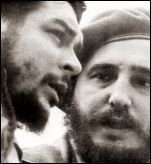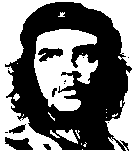
Cuba in the 1960s
An Introduction
As the newly established Cuban Revolution drifted towards a Marxist-Leninist political system in the early months of the new decade, relations with the U.S. grew cold and stale, and came to an abrupt end in early 1961.
Upper class and professional Cubans were leaving the island in droves, as the new government seemed to embody a disturbing new ideology. By mid 1960, Cuba and the Soviet Union had established formal diplomatic relations, and oil companies owned by Shell, Esso and Texaco, were nationalized after they refused to refine Soviet oil.
In December 1959 Cubans began to send their children to the U.S., afraid of "loosing them to communism." (Over 14,000 Cuban children who came to the U.S. in this manner are now remembered as the Pedro Pan kids.) At the same time, various newspapers in the U.S., Mexico, and Latin America were running articles warning of an imminent U.S. attack on Cuba.
The recently elected Kennedy administration denied emphatically that an attack on Cuba was planned, but in mid-April an attack took place at Bay of Pigs. The invasion was easily defeated by the Cubans, who were prepared, lacking only knowledge of exactly where and when the attack would take place. About 1,200 Cuban counterrevolutionaries were taken prisoner, and among the 200 or so who died in battle, four were American pilots.
Eighteen months later the Crisis of October, known in the U.S. as the missile crisis, brought the world to the brink of a nuclear showdown, eventually ending in the withdrawal of Soviet nuclear missiles from Cuba, and a U.S. promise to not attack Cuba again.
The rest of the decade didn't change much for Cuba, who pursued relations with Soviet Bloc nations while the U.S. pursued a tract of covert hostility and isolationism against "Castro's government."
The embargo that began in 1960 soon was cranked up to the next level, and Cubans were forced to scramble for food and consumer goods. Relations with the Soviet bloc also went up a notch, and Cuba got center-stage attention from the whole world as she tried to survive U.S. and counterrevolutionary hostilities.
There were also problems with the Soviets, with whom the Cubans did not always get along. In January 1968, thirty-seven members of the Cuban Communist Party were charged with treason for conspiring with the Soviets against the Cuban government. Eight were found guilty and expelled from the island.
The decade ended with the widely lauded goal of a 10-million-ton sugar crop for 1970. It became the holy grail of the Revolution on its tenth birthday, and turned out to be 1.5 million tons short.
Cubans, by this time, were used to major disappointments. But, as always, they managed to survive the difficult times by looking forward to a more prosperous future that might or might not come, and living today to the fullest extent possible.
The Timetable - 1960
Bay of Pigs - BOP 101 - A quick overview | Speech by Castro on May Day, 1961 | JFK on Cuba | Dean Rusk on Bay of Pigs

1960, New Year's Eve | Mikoyan visits Cuba | Fidel's U.S. Visit - Excerpts from Carlos Franqui's Family Portrait with Fidel
Fidel Castro: How I became a communist | Who are the Pedro Pan Kids?
Richard J. Walton's Cold War and Counterrevolution: The Foreign Policy of John F. Kennedy | Excerpt from KENNEDY by Theodore Sorensen
The Cuban Missile Crisis aka The October Crisis of 1962: An Introduction | A Timeline | Lessons of the Missile Crisis - Excerpt from: Sad and Luminous Days: Cuba's Secret Struggles witht the Superpowers After the Cuban Missile Crisis
Castro sends a verbal message to President Lyndon B. Johnson
On U.S.-Cuba relations | On racism - Excerpts From Terrence Cannon’s Revolutionary Cuba
Camilo Cienfuegos |
Raul Castro
Ernesto
Che Guevara
Huber Matos | Rolando Cubela Secades aka AMLASH | José Miró Cardona | Tony Varona | Manuel Artíme |
Che on mistakes of The Revolution | Che's farewell letter to Castro | Castro remembers Che
Excerpts from Cuba: A Short History, Edited by Leslie Bethell - On Economic Performance | On Immigration to the U.S.
Revolution Gallery | The Economic Embargo - A timeline
Excerpt from SARTRE on Cuba
Nicolás Guillén
| Tengo (I Have)
- A Poem in Spanish / English
Use of this site implies full agreement with the terms and conditions under which this site is available.
